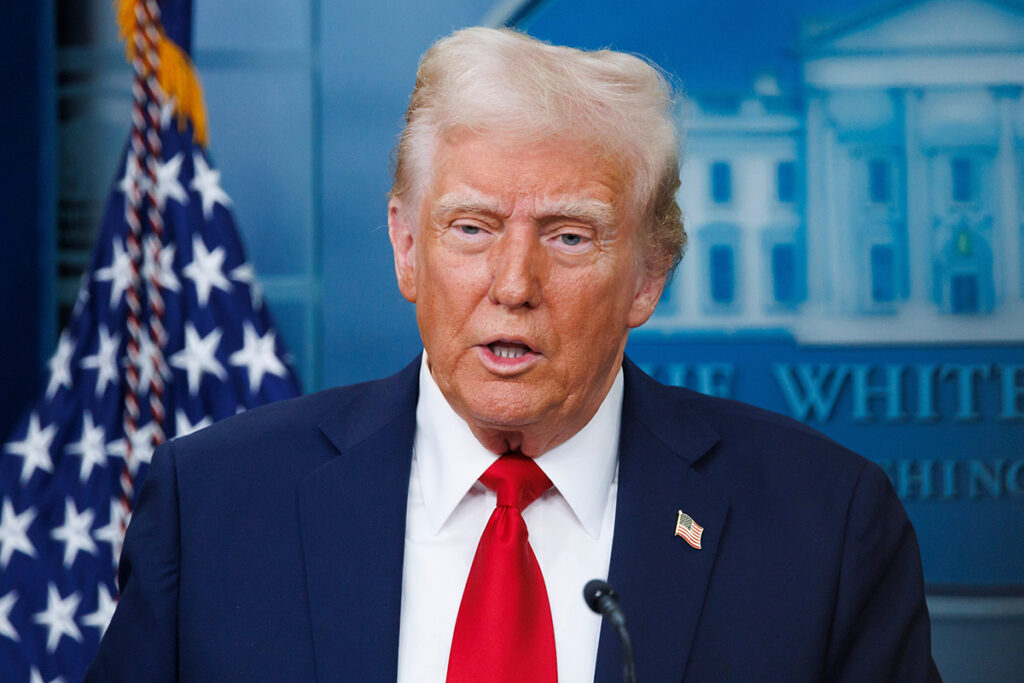Financial markets around the world plunged Thursday following President Donald Trump’s announcement of extensive new tariffs, sparking fears of a global economic slowdown reminiscent of the COVID-19 pandemic era.
The Dow Jones Industrial Average plummeted approximately 1,500 points, dropping nearly 3.6% by mid-morning. Similarly, the broader S&P 500 index sank by 4.3%, marking its steepest decline since the dramatic economic downturn caused by COVID-19 five years ago. Technology-driven Nasdaq was hit even harder, shedding 5.6%, highlighting investor anxiety over the severe implications of the tariffs.
Widespread Impact Across Financial Sectors
The global sell-off extended beyond traditional stocks, significantly impacting commodities and currencies. Even traditionally secure investments, such as gold, experienced declines despite recently hitting historic highs due to investors seeking safe havens. Smaller American companies were notably affected, with the Russell 2000 index tumbling 6.6%, officially entering a bear market after a drop exceeding 20% from its recent peak.
Experts anticipated that President Trump would impose new tariffs, but his announcement Wednesday night exceeded expectations in both scope and severity. Trump confirmed a minimum 10% tariff on imports, escalating sharply for specific countries, notably China and European Union nations. Analysts from UBS suggest these measures, unseen in their magnitude for nearly a century, could slash U.S. economic growth by up to 2 percentage points this year while inflating prices by nearly 5%.
Wall Street Faces New Reality of Prolonged Tariff Impact
Market strategists had long presumed that Trump’s tariff threats served primarily as a negotiating tactic rather than permanent economic policy. However, this latest move has shaken investor confidence, signaling a potential shift towards a prolonged period of protectionism designed to repatriate manufacturing jobs to the United States—a complex objective that may span years.
According to Mary Ann Bartels, Chief Investment Officer at Sanctuary Wealth, markets were caught off guard by the unexpectedly aggressive measures. Meanwhile, Bhanu Baweja, a strategist at UBS, expressed that the severity of these tariffs might lead rational market participants to hope for a rapid resolution to avoid lasting damage to the global economy.
Sean Sun from Thornburg Investment Management suggested markets might actually be underestimating the potential fallout, particularly if these high tariff levels become permanent. The cascading impacts on international trade and consumer demand could deepen recessionary pressures worldwide.
Federal Reserve Response Limited by Inflation Concerns
Investors are increasingly looking to the Federal Reserve for potential interest rate cuts as a means of cushioning the economic blow. Market expectations for Fed interventions drove significant shifts in bond markets, with yields on the benchmark 10-year Treasury dropping sharply to 4.02% from recent highs.
However, the Fed’s ability to ease monetary policy faces significant constraints. Lowering interest rates typically stimulates economic growth by encouraging borrowing and spending, but it also risks exacerbating inflation—a critical concern heightened by the current tariffs. American households, already burdened by recent inflationary pressures, could soon face even steeper price increases on essential goods.
Despite market turmoil, recent economic data still provides some hope. Reports indicate continued resilience in the U.S. labor market, with jobless claims remaining lower than economists predicted. Additionally, business activity in the U.S. service sector grew last month, although at a slower rate than anticipated.
Yet, industries directly affected by tariffs are already voicing concerns. Businesses reliant on imported goods, such as construction and retail, are beginning to feel immediate disruptions. A report from the Institute for Supply Management highlighted growing uncertainty among companies. Construction companies reported initial impacts from aluminum tariffs, while delays and disruptions in supply chains have started affecting operational efficiency and customer satisfaction.
Global Markets Echo U.S. Fears
Trump’s aggressive tariff policy sparked substantial declines in international stock markets, underscoring global anxiety. European markets experienced significant losses, with Germany’s DAX falling by 2.9% and France’s CAC 40 by 3.4%. Asian markets also registered notable declines, with Japan’s Nikkei 225 dropping 2.8%, Hong Kong’s Hang Seng down 1.5%, and South Korea’s Kospi falling 0.8%.
The widespread reaction signals that investors worldwide are deeply concerned about the tariffs’ potential to trigger stagflation—a troubling scenario combining stagnant economic growth with rising inflation. As market volatility intensifies, the full impact of Trump’s policies remains uncertain, setting the stage for further global economic turbulence.


